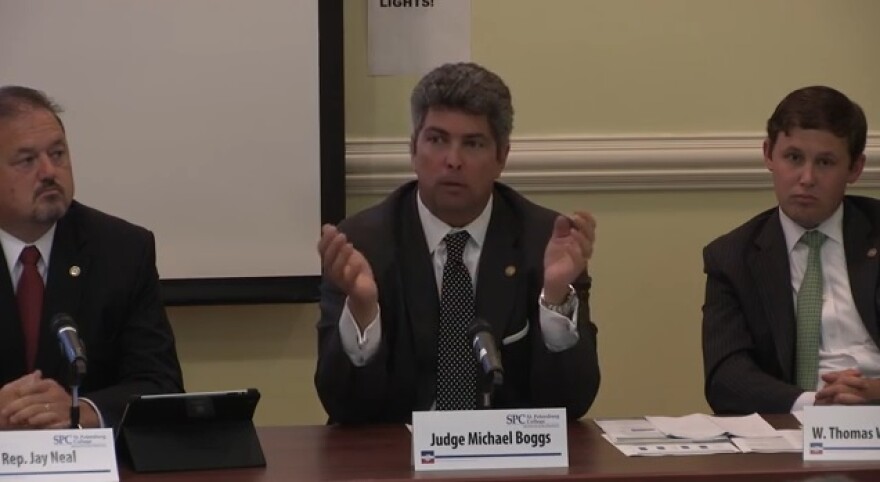As Florida looks to make sure released inmates don’t return to prison, should the Sunshine state look to other states, like Georgia, to learn about their criminal justice reforms?
Housing about 102,000 inmates, Florida’s prison system is the third-largest in the U.S. According to state economists, that number is projected to increase in the next few years. A contributing factor is the number of released inmates going back to prison. Recently, some, including current and former Florida officials, heard from their counterparts in Georgia about efforts there to reduce recidivism…
“In Georgia, we have about 55,000 inmates in our Department of Corrections and about 10 million people in Georgia. So, our population and our prison population are exactly half of yours down here in Florida. However, we have the same exact number of people on probation as you do.”
Thomas Worthy is the Co-Chair of the Georgia Council on Criminal Justice reforms, a panel made up of criminal justice experts who sent recommendations to Georgia lawmakers and Governor Nathan Deal about what to do about Georgia’s rising prison population.
Worthy made his comments at a recent forum held by the James Madison Institute Institute, Florida State University’s Project on Accountable Justice's Dr. Allison DeFoor, and former FSU President Sandy D'alemberte called “A Tale of Two States: What Can Florida Learn from Georgia’s Criminal and Juvenile Justice Reforms?”
Others on the panel included former Georgia Representative Jay Neal, who recently stepped down to lead the state’s re-entry program at the Georgia Department of Corrections. But, during his time in the Georgia Assembly, he led the state’s recent criminal justice reform effort.
“For example, prior to 1176, it didn’t matter if you were stealing a lawn mower out of a yard, our breaking into a shed, or coming into a residence, we had one sentencing range of burglary. So, we broke that into degrees. So, that should be an easy answer. To know that there’s a real difference between breaking into a shed behind a house and breaking into a dwelling,” said Neal.
Another panelist, and the other co-chair of the Georgia criminal task force, appellate court Judge Michael Boggs, says the focus recently has been criminal justice and juvenile justice reforms. He says what Georgia is working on now is the last part of what he calls a “three-legged stool:” re-entry back into society.
“We recognize some deficiencies in our system that I think we can fix through building transition centers, ensuring that they have good substance abuse/mental health treatment services available to them," said Boggs.
“Most judges will tell you, you send someone to a rehab facility run by the Department of Corrections or anyone else and they get out and the failure is always the follow-up, the after treatment, the aftercare piece of the puzzle is where the ball gets dropped. And, so, we need a better continuum of services there, and that’s what we hope the re-entry piece will provide.”
Florida Department of Juvenile Justice Secretary Wansley Walters may already be working on something like that, particularly for juveniles. Speaking before a recent House Criminal Justice Subcommittee, she outlined a new juvenile justice reform proposal that includes starting community re-entry teams tailored to minors.
“Much of what constitutes our re-entry is no longer just one probation officer that checks in after the child comes home, but literally, an entire team—very inclusive of the family, very individually tailored, that starts before a child goes in and continues outside,” said Walters.
She’s also been a supporter of giving juveniles civil citations instead of arresting them. That’s part of an initiative to cut down on the so-called “school-to-prison pipeline.” But, Florida State University criminology professor Dan Mears says he’s not sure the reforms are accomplishing that.
“You know, piecemeal legislation where you say you’re going to do something about the school-to-justice system pipeline, it sounds good, and it may do some good in some small way in some areas. But, overall, it’s like a magician, with that trick where no one sees what they’re doing with the left hand because they’re swirling about in the air with their right hand, and you miss that without systemic reform, you just end up with a lot of inefficiency and a lot of ineffectiveness,” said Mears.
Mears agrees Florida would do well to look at other states’ prison reforms, but he urges caution because what may work for one state may not work in another. Georgia, the fifth largest prison system in the country, has already enacted a series of reforms, including addressing mandatory minimum sentencing. That’s something Florida has been trying to address on the adult and juvenile level as well.
Already a bill is moving through the Legislature aimed at addressing what some say are the unintended consequences of Florida’s 10-20-Life law. And the head of Florida Senate’s Budget panel for criminal justice issues, Fleming Island Republican Senator Rob Bradley, has filed a bill to change Florida’s sentencing laws for juveniles convicted of non-homicide crimes.
Meanwhile, Bradley says he has talked with former Representative Jay Neal about Georgia’s criminal justice reform. He says as the chair of the Senate Budget panel that looks at criminal justice issues, he’ll be “studying these issues closely” to help further reduce Florida’s recidivism rates.
For more news updates, follow Sascha Cordner on twitter @SaschaCordner.



